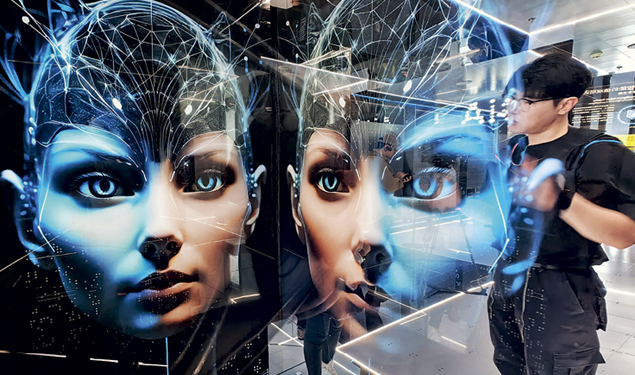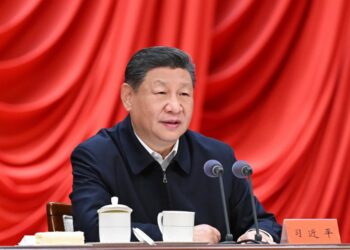Shanghai Tower hosts the first AI Dream immersive project on April 12, 2024.
Xiao Wei, an audio algorithm engineer at Chinese tech giant Tencent, spent about five years improving audio quality through artificial intelligence (AI), specializing in noise reduction and sound purification. This innovation provides users with a significantly improved hearing experience, ensuring clarity and authenticity.
As an engineer in the emerging field of AI, his work begins with the meticulous collection of noise samples, a fundamental and labor-intensive step crucial to machine learning. Equipped with his headphones and tape recorder, he travels everywhere to collect a vast range of sound data.
“We collected about 300 types of noises,” says Xiao Wei. Designed to simulate real-world sound environments, his team’s acoustics lab, a square room equipped with eight loudspeakers, creates an extreme testing environment to ensure high-quality data recording.
His profession lies in the field of engineering and AI technology. Since 2019, the Ministry of Human Resources and Social Security has continued to introduce new professions relating to AI. To date, China officially recognizes 106 digital professions.
New areas
Zhai Yujia is an AI trainer at Kwai, a leading video sharing platform in China. His main responsibility is to train a digital personality called Guan Xiaofang. “We train not only his IQ, but also his EQ, which allows him to better perceive and understand humans, thus promoting more interesting conversations and interactions,” she says.
The AI digital human trainer is one of the new digital professions recently listed by the Ministry of Human Resources and Social Security, classified under the AI trainer profession. Guan Xiaofang is a product driven by large AI models, often built from billions or even trillions of parameters.
In the context of AI applications, digital humans have become an important research and development direction in recent years, leading to the emergence of different digital personalities, including presenter, narrator, intelligent customer service agent and avatar. digital. Today, with the rapid integration of large AI models, digital humans are achieving higher and higher levels of intelligence.
“We need to prepare hundreds of thousands of data points at the beginning of training, both manually written data and basic data generated by the model,” explains Zhai Yujia. We are constantly optimizing and supplementing the training data, to achieve a virtuous circle that makes Guan Xiaofang more and more intelligent. »
Liu Hongyu, AI Product Manager at Huawei, is at the forefront of a new profession: operating generative AI systems. This role involves applying large AI models across different industries. For example, Mr. Liu and his team are developing a customs knowledge assistant application.
To do this, they gathered tens of thousands of pieces of information related to customs and international trade, annotated them to build a high-quality database, and trained a language model specialized in knowledge questions and answers customs authorities using a general model.
Then, by refining the solicitation methods and optimizing the model’s workflow, they continually improved the accuracy of its responses, creating a practical and useful application.
Last year, generative AI models sparked a new technology wave. Industries are in dire need of generative AI applications to enhance their capabilities, which has led to the emergence of the generative AI application system operator profession.
“From the perspective of professional evaluation criteria, generative AI has rapidly promoted the creation of various professions, despite its short history,” notes Fan Wei, a researcher at the Chinese Academy of Personnel Sciences. The government quickly announced related professions to guide and regulate the orderly and rational development of this technology. According to our estimates, a new profession can generally create 300,000 or 500,000 jobs. »
From campus to business
The scale of China’s digital economy reached more than 50 trillion yuan by the end of 2022, accounting for 41.5 percent of GDP, according to the China Academy of Information and Communications Technology. This rapid development requires more and more people qualified in AI. Current estimates indicate that there is a need for more than 5 million talents.
Earlier this year, the Ministry of Human Resources and Social Security, together with nine other departments, released the Action Plan to Accelerate the Training of Digital Talents to Support the Development of the Digital Economy (2024- 2026).
Many companies and universities have already taken action. Since 2021, Meituan, a major e-commerce platform for services in China, has collaborated with Tsinghua University, launching dozens of research projects in the fields of intelligent unmanned system, linguistic intelligence and economics. digital. Additionally, they launched long-term courses on applications of big data technology.
Zhang Hongchao, who recently completed his doctorate in microelectronics and semiconductor electronics at the Beijing University of Aeronautics and Astronautics, received an anticipated job offer from a micro-company
electronics in the Chinese capital, where he had previously completed an internship of more than two years as an equipment R&D engineer.
In fact, this internship with the storage chip developer gave him considerable experience and a deep understanding of the company’s needs. “My future job is in line with the research topics of my doctorate,” says Mr. Zhang.
According to Li Xueming, director of the talent strategy and policy research office under the Chinese Academy of Personnel Sciences, digital skills play an important role in technological innovation and are a key support for transforming business modes. economic development and promote development.
“Accelerating the training of digital talent, with a focus on training high-level digital engineers and highly skilled professionals, is both an immediate priority and a long-term strategy,” he emphasizes.
*YUAN YUAN is a journalist at Beijing Information.








